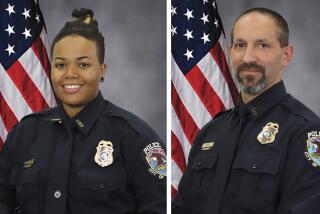Appeal Court Upholds Detention of Suspect in Teen’s Slaying
- Share via
San Diego police officers acted properly in detaining Mark Alan Radke for the brutal 1988 killing of a Mira Mesa teen-ager, a state appellate court in San Diego has confirmed.
The 4th District Court of Appeal’s ruling opens the door for prosecutors to admit evidence that police, searching for the killer of 16-year-old Jeffrey Rudiger, gathered after officers detained Radke at a traffic stop. Radke has been charged with murdering Rudiger and remains free on $200,000 bail.
The order, released Tuesday, nearly two years to the day after Rudiger’s death, was the result of a third appeal in the complex case and was completely contrary to a July, 1988, ruling from the same three-judge panel.
That prior decision, a finding that police were overzealous and violated Radke’s constitutional rights, appeared to make virtually all evidence in the case off limits to prosecutors. Tuesday’s decision, which promises to make the evidence available, was based primarily on police testimony presented for the first time last September.
Because of the mixed signals, Radke’s defense lawyer, Douglas C. Brown, said he would appeal Tuesday’s order to the state Supreme Court.
“We all felt the arrest was unlawful and still feel that way,” Brown said.
Rudiger’s sister, Kelly, 22, the family’s spokeswoman, said she was not surprised that Brown planned to appeal but expressed hope that the appeal will be denied and Radke will finally go to trial.
“I feel that no court in the land will turn around this decision,” Rudiger said. “It’s been seen by enough authority figures that this decision should and will stand.”
Jeffrey Rudiger, a student at Mira Mesa High School, disappeared after work on the night of Jan. 21, 1988. His handcuffed, partly clothed body was found the next day near a Scripps Ranch commercial center.
Rudiger appeared to have been struck repeatedly with a hammer, and prosecutors say he had been sexually attacked.
Radke, now 23, who had worked with Rudiger at a Chuck E. Cheese pizza parlor, became a suspect after co-workers told police the pair had planned to meet the night Rudiger disappeared.
Detectives examining Radke’s car in the pizza parlor’s parking lot Jan. 22 found that the tread from one tire resembled marks left in a pool of blood at the slaying site. Later, when handcuffing Radke at the traffic stop, officers noticed that Radke’s hands were swollen and cut, as if he had been in a fight.
Blood matching Rudiger’s type was found inside and on the exterior of the car, and on Radke’s jacket.
In July, 1988, a three-judge 4th District panel ruled that the officers’ conduct at the traffic stop violated Radke’s constitutional right to be free from unreasonable searches and seizures. Police erred by placing Radke in handcuffs while taking him in for questioning and by drawing a revolver, according to the opinion.
The 2-1 ruling appeared to bar all evidence stemming from investigations that followed the stop. Justice Don R. Work wrote the opinion, with Justice Howard B. Wiener concurring. Justice William L. Todd Jr. dissented, saying the police work, even the handcuffing, was justified.
Prosecutors appealed the ruling to the state Supreme Court and the U.S. Supreme Court, but both declined to hear the case.
Last February, both sides returned to San Diego Superior Court for a hearing on what evidence remained admissible. Brown asked Judge J. Perry Langford to suppress all evidence against Radke and to dismiss the case.
Langford declined, saying he viewed the traffic stop as unlawful. But he also rejected prosecutors’ request to use previously unheard police testimony, including statements from the two officers who stopped Radke.
Both sides appealed that ruling. In a unanimous decision issued last March 30, the same three judges gave prosecutors the right to introduce the new testimony.
At a hearing last September, San Diego Superior Court Judge Charles Hayes allowed extensive testimony, including statements from the two officers, over defense lawyer Brown’s objection, and ruled that whatever police obtained after the traffic stop was legally acquired.
Officers had probable cause to arrest Radke, and, even if they didn’t, he voluntarily consented to go with them downtown for questioning, Hayes said, citing the two primary methods by which police may legally acquire evidence.
Officers had probable cause--or a “strong suspicion” that the person is guilty of a crime--to arrest Radke before they ever saw him at the traffic stop, Hayes said. Particularly critical was the tire print, which Hayes called “almost a carbon copy” of the tire on Radke’s car.
In Tuesday’s ruling, the same three appellate judges voted to deny Brown’s appeal of Hayes’ ruling.
Based on the evidence Hayes considered, the officers had probable cause to arrest Radke when they stopped him, so the searches and seizures that followed were legal, Work said in a one-page order. He did not elaborate.
More to Read
Sign up for Essential California
The most important California stories and recommendations in your inbox every morning.
You may occasionally receive promotional content from the Los Angeles Times.













